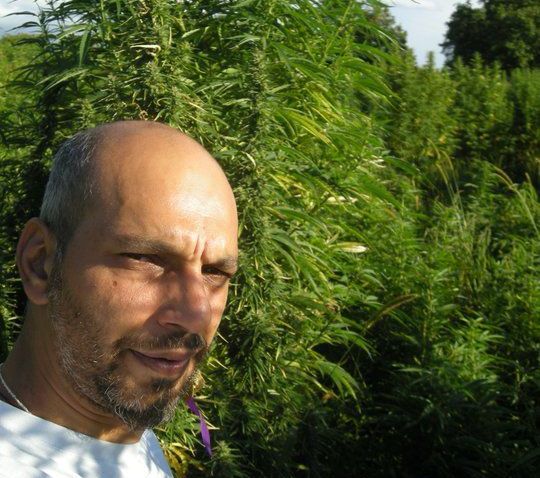Researchers and medical cannabis patients met at the Prague Medical Cannabis Conference to discuss the latest developments in the field. On the sidelines, Drugreporter's guest author Iga Jeziorska interviewed two activists who were involved with the recent founding of the International Medical Cannabis Patients' Coalition.
Physicians from various countries and specialisations, pharmacists, activists and patients, met between March 4th and 7th at the international Medical Cannabis Conference in Prague. The discussion and presentation topics were mostly highly specialised in particular branches of medicine, including cancer, tumours, dermatology, and psychiatric disorders, such as PTSD or psychosis.
From the point of view of drug policy reform, it was a positive thing to see professionals supporting the use of cannabis as a medicine, providing scientific evidence of its efficacy in a wide range of diseases, and advocating for policy change.
An important highlight of the event was the establishment of the International Medical Cannabis Patients' Coalition. Drugreporter’s guest author Iga Jeziorska interviewed two of the founders of the Coalition.
The two French activists, Farid Ghehiouèche (founding member of Cannabis Sans Frontières) and Kenzi Riboulet (outreach committee member of Chanvre et Libertés) were very much involved in the formation of the new Patients' Coalition.
Iga: Three days ago, the Medical Cannabis Conference ended. Now we are in Vienna, at the annual meeting of the United Nations Commission on Narcotic Drugs. What are your impressions of these two events?
 Farid: In terms of Prague, I think that was the first international medical cannabis conference that was so open to the general public. There had previously been events for high-profile scientists, researchers and patients, but now we have prepared the ground to inform ordinary people about results coming from the scientific field. We've had twenty years of surveys, reports, studies and an increasing level of knowledge, so now lots of people are aware of the potential of cannabis plant as a medicine. Also, they've done their own research and can set that against with the ugly, negative picture currently presented in different countries, especially because of the UN conventions. Now we have this situation: On the one hand, millions of people who are directly concerned about cannabis use as a medicine, and a growing number of scientists who are becoming interested in the subject, especially because of the research on how to cure cancer or to help people with cancer, psychosis, PTSD and many different diseases, like HIV or Hepatitis C. On the other hand, we have the world of politics, and very, very negative attitudes towards marijuana.
Farid: In terms of Prague, I think that was the first international medical cannabis conference that was so open to the general public. There had previously been events for high-profile scientists, researchers and patients, but now we have prepared the ground to inform ordinary people about results coming from the scientific field. We've had twenty years of surveys, reports, studies and an increasing level of knowledge, so now lots of people are aware of the potential of cannabis plant as a medicine. Also, they've done their own research and can set that against with the ugly, negative picture currently presented in different countries, especially because of the UN conventions. Now we have this situation: On the one hand, millions of people who are directly concerned about cannabis use as a medicine, and a growing number of scientists who are becoming interested in the subject, especially because of the research on how to cure cancer or to help people with cancer, psychosis, PTSD and many different diseases, like HIV or Hepatitis C. On the other hand, we have the world of politics, and very, very negative attitudes towards marijuana.
Iga: Saying that this was the first event of its kind, do you think we are witnessing some kind of turn in a good direction, from the point of view of cannabis policy reform?
Farid: As we're here in Vienna, I can tell you that we're still very far from this kind of thinking. But then, the thing which is positive and can put us in an optimistic frame of mind, is the fact that during the conference in Prague, patients, NGOs, and various organisations advocating for the medical use of cannabis got together and decided to create a new, global network, called the International Medical Cannabis Patients' Coalition. During these three days, we've run a number of meetings, where we've already established a declaration which represents the first statement from this patients' group…
Iga: …and a starting point for further activities?
Farid: Of course. Two of us decided to target Prague before Vienna, to try to get the message across, that people who were in Prague should also come here. It was also clear in my mind, that everybody in Prague should be aware that inside this UN apparatus, during this official UN CND programme, there would be a fringe event covering a patients' review of cannabis use as a medicine. Last year, there was a small fringe event, which the Austrian government followed, and one of the speakers was Eberhard Pirich, an Austrian doctor who was also attending the conference in Prague last week. It was the first time when we had such a good presentation on how cannabis can be useful for pain treatment and different health problems. I remember Mr Gilberto Gerra, the UN representative in charge of research and treatment, saying in his opening speech to this panel, that if we're talking about cannabis as medicine, we're on the track of green golden treasure. I think that these words show us the direction we should try to push for.
Kenzi: The coalition's goal is safe and legal access to medical cannabis worldwide for people who need it, according to the list of diseases for which cannabis is useful. It's a list compiled by the International Association for Canabinoid Medicines, embracing doctors, so you can see that we already have an international organisation in place, of physicians who are supporting and conducting research on medical cannabis. And now, the other, complementary side of the issue is included – the patients.
Iga: So you're planning to cooperate closely with this association, then?
Kenzi: Yes, indeed. For instance, the French part of IACM, which is UFCM (L’Union Francophone pour les Cannabinoïdes en Médecine), is one of the founding organisations of IMCPC, so we have their support from the beginning. The coalition was launched at the conference in Prague, which was organised under the patronage of the Health Minister of Czech Republic, so, right from the start, IMCPC embodies a strong link between physicians and patients. However, our goals are also to change the UN treaty and to help patients to create their own support organisations locally in various countries. Michael Krawitz, who is an executive director of Veterans for Medical Marijuana Access, and a board member of IACM, had already presented the IMCPC initiative at the United States and Czech Republic government receptions at UN CND.
Iga: What do you mean by self-support organisations? Do you see them looking similar to Spanish Cannabis Social Clubs, or as organisations for acquiring the medicine, or for advocacy?
Kenzi: Definitely for advocacy. We want them to provide their members with legal protection, to ensure proper representation in case of problems with the law, and also to gather together people who can help with the preparation of proper and reasonable policy reform proposals.
Iga: So you want to focus on both: bottom-up and top-down approaches for the reform?
Farid: Yes, we want to approach it from each and every possible side, to make it as efficient and successful as possible. We have to bear in mind that next year's UNGASS will represent a major turning point for drug policy, and we have to focus on this. Mainly, we need to bring to New York as many civil society representatives and activists as possible, as well as people who use drugs.
Iga: Do you also plan to cooperate with organisations active in the sphere of recreational cannabis use?
Farid: It will depend on the approaches at national levels. We are trying to defend the right to grow plants, to use plants, to help end prohibition, which is a kind of moral-based policy with has no evidence or research basis, and which has turned out to be catastrophic in its consequences. When we look at the interests of cannabis users, we can clearly see that they represent eighty per cent of those who are arrested by the police (for drug-related offences – I.J.), and of those sent to courts and put in prison. We therefore have to defend those who use cannabis, and we don't want to have to define in advance whether that use is medical or recreational. We want to make cannabis as available as possible, so that people can benefit from its various properties.
Interview by Iga Jeziorska





